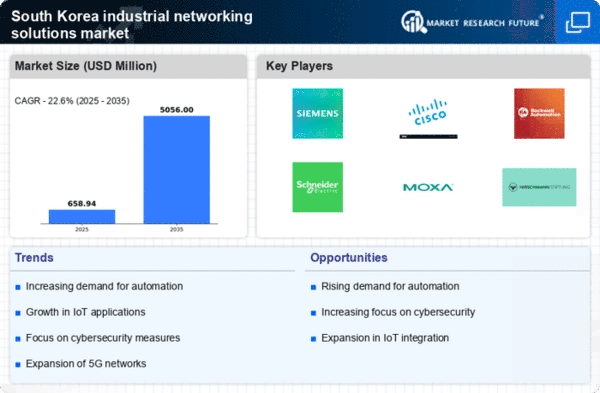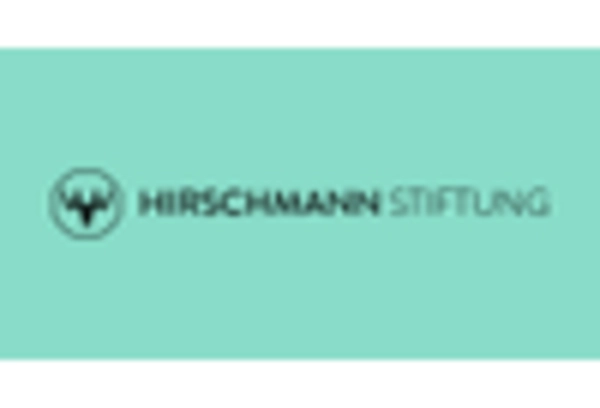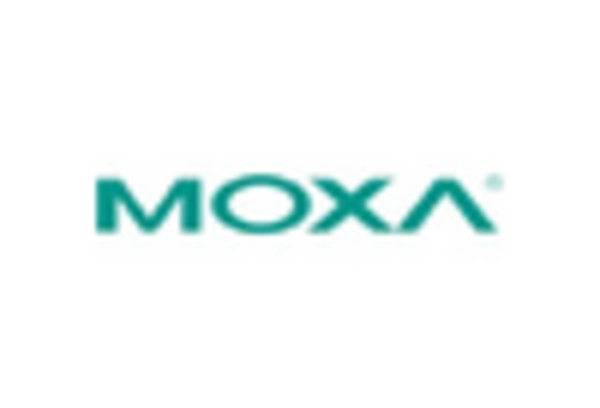Rising Demand for Automation
The industrial networking-solutions market in South Korea experiences a notable surge in demand for automation technologies. As industries strive for enhanced efficiency and productivity, the integration of automated systems becomes paramount. This trend is particularly evident in manufacturing sectors, where automation can lead to a reduction in operational costs by up to 30%. Furthermore, the adoption of robotics and automated machinery necessitates robust networking solutions to ensure seamless communication and data exchange. The industrial networking-solutions market is thus positioned to benefit from this growing inclination towards automation, as companies seek to modernize their operations and remain competitive in a rapidly evolving landscape.
Need for Enhanced Data Management
In the context of the industrial networking-solutions market, the need for enhanced data management is becoming increasingly critical. As industries generate vast amounts of data, the ability to effectively manage and analyze this information is essential for informed decision-making. Companies are investing in networking solutions that support big data analytics and cloud computing, which are projected to grow at a CAGR of 25% in the coming years. This trend indicates a shift towards data-driven strategies, where networking solutions play a vital role in ensuring data integrity and accessibility. The industrial networking-solutions market is thus poised to expand as organizations prioritize data management capabilities.
Growing Focus on Energy Efficiency
The industrial networking-solutions market is witnessing a growing focus on energy efficiency, driven by both regulatory requirements and corporate sustainability goals. South Korea's commitment to reducing greenhouse gas emissions has led to the implementation of stricter energy regulations across various industries. As a result, companies are increasingly adopting networking solutions that enable better monitoring and control of energy consumption. It is estimated that energy-efficient technologies can reduce operational costs by up to 20%. This trend not only aligns with environmental objectives but also enhances the competitiveness of businesses in the industrial networking-solutions market.
Expansion of Smart Manufacturing Initiatives
Smart manufacturing initiatives are gaining traction within South Korea, significantly impacting the industrial networking-solutions market. The government's push towards Industry 4.0 has catalyzed investments in smart factories, which leverage advanced networking solutions to optimize production processes. It is estimated that the smart manufacturing sector could contribute approximately $30 billion to the national economy by 2025. This growth is driven by the need for real-time data analytics, machine-to-machine communication, and enhanced supply chain management. Consequently, the industrial networking-solutions market is likely to see increased demand for technologies that facilitate these smart manufacturing capabilities.
Advancements in Wireless Networking Technologies
Advancements in wireless networking technologies are significantly influencing the industrial networking-solutions market. The proliferation of 5G technology is expected to revolutionize industrial communication by providing faster data transfer rates and lower latency. This development is particularly beneficial for applications requiring real-time data exchange, such as remote monitoring and control systems. The industrial networking-solutions market is likely to see a shift towards wireless solutions, as companies seek to enhance connectivity and flexibility in their operations. With the potential to improve operational efficiency and reduce infrastructure costs, the adoption of advanced wireless technologies is set to reshape the landscape of industrial networking.
















